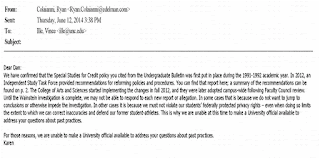by Ted Tatos
Yesterday, I discussed the evidence that UNC violated its own academic policy regarding the limits on independent studies as a follow-up to Dan Kane's article in the News and Observer. (for more details on this issue, Mr. Kane's article is highly recommended.) The implications for violating this policy reach beyond the academic fraud issues and could impact the validity of UNC's Pell Grant awards.
Why? Enrollment status is used to determine federal student aid awards. A student enrolled half-time only receives half of the award given to a student enrolled full-time. The determination is made based on credits towards the degree in which the student is enrolled.
Courses students took in excess of the 12-hour total and 6-hour per semester total did not count toward the degree. The Federal Student Aid Handbook states:
If a student is enrolled in courses that do not count toward his degree, they cannot be used to determine enrollment status unless they are noncredit or remedial courses as described in the sidebar. This means you cannot award the student aid he would otherwise not receive for classes that do not count toward his degree or certificate.
FSA Handbook, 2004-2005 at Page 1-10. (the language is virtually the same across years. I used 2004-2005 because it corresponds to the example I use below. An archive of FSA Handbooks can be found here.)
The implication of this policy is this: If the credits counted for the degree, they did so in apparent violation of UNC's own policy limiting independent study credits to 12 hours total and 6 per semester. If the credits did not count toward the degree, then a Pell Grant violation may have occurred, if the amount of award, when given, exceeded the amount commensurate with the number of courses taken that counted toward the degree.
For example, in Spring 2005, Rashad McCants, a UNC MBB player, took 4 independent studies for 12 credits. According to his own statements, he did not attend class, did little or no work, and yet still made the Dean's List. That may represent academic fraud, but, if Mr. McCants was receiving Federal Student Aid in Spring 2005, it would also represent a potential violation of federal law on UNC's part. Mr. McCants had already taken at least 15 credits' worth of independent studies. So, by UNC policy, none of the 12 credits he took in Spring 2005 should have counted toward the degree, meaning he could not receive federal student aid.
Whether he did or not, I don't know. I am simply using Mr. McCants' case as an example. But there is clear evidence in the documents that many athletes received federal student aid and that athletes exceeded the University limits on independent study credits.
While this issue also impacts the current NCAA investigation of UNC, the latest findings raise the question of whether UNC broke federal law by including courses that should not have counted toward students' degrees to determine aid eligibility.
And if UNC did it, how widespread is the problem? Are federal dollars, designed to assist students in obtaining an education, actually being used instead to ensure athlete eligibility to continue funding athletic department coffers?





